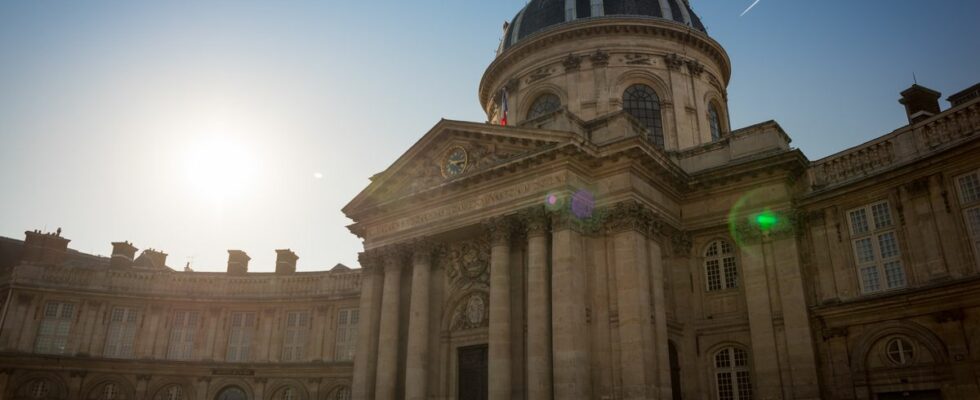The duel promised to be tight and the two midshipmen leave without a seat. This Thursday, the writers Frédéric Beigbeder and Benoît Duteurtre clashed in an election to the French Academy. At 57 and 62 respectively, the two authors hoped to rejuvenate the institution where the average age is 70 and is a short head above that of the readers of 20 minutes (we laugh). The youthful look would still have been quite relative for this 388-year-old institution which appears dusty in the eyes of many French people.
Difficult to renew oneself at the Quai de Conti, the armchairs being kept until death. Frédéric Beigbeder and Benoît Duteurtre are, however, highly publicized authors and could have helped to “rejuvenate the image of the institution” which can be a “strategy in order to have more legitimacy in the general population”, underlines Mary C. Lavissière, lecturer at Nantes University and specialist in institutions and language.
An institution out of step
Still, the French Academy would not have made its internal revolution by integrating one of the two popular writers. “Being young does not necessarily mean being subversive, whether they are young or old, it depends rather on their relationship to the language”, underlines the linguist Véronique Perry. And in the world of immortals, there’s no question of being subversive.
In November 2021, the Robert’s online dictionary integrated the word “iel”, causing a myriad of outraged reactions. The deputy of the majority François Jolivet then denounced the arrival of the agender pronoun and seized the immortals. In 2017, the Academy called inclusive writing a “deadly peril” for the French language. The institution is often out of step with the use of the language. The “guardian of the French language” most often expresses himself to decry words or expressions that appear on the lips of speakers.
“An eagle” but “the Covid”
During the pandemic, “the French Academy decided that it was necessary to say” the Covid “when the general use was” the Covid “, which all the speakers accepted”, recalls Mary C. Lavissière. The immortals choose “standards which are not necessarily what is said most generally but rather the standards of what “should be said”, it is an institution which sees itself as the guardian of “correct” French”, explains the lecturer.
A “correct” French and especially that of the upper social classes. The French Academy estimated in 2008 that the recognition of regional languages amounted to a “denial of the Republic”. As for inclusive writing, it would be a “mortal danger” and Franglais a “worry”. “However, the institution did not hesitate to accede to Napoleon Bonaparte’s request to that an eagle becomes “an eagle“”, recalls the writer Audrey Alwett. Indeed, the emperor wanted to make it his emblem and the feminine was (is) considered degrading. The immortals therefore promptly acceded to his request.
A “classist, sexist and racist” language
“The language belongs to the people and to regulate the language through an academy is in itself a form of authoritarianism and appropriation”, denounces Véronique Perry, for whom the institution is an “aberration”. Created in 1647, under the leadership of Cardinal Richelieu, the French Academy has always aimed to monitor the French language or a certain idea of the French language. “The objective was to provide a rule, but also to impose, because language has political, economic and even cultural power,” says Mary C. Lavissière. The Academy is therefore protective of a “pure” language, according to its own definitions, which turns out to be “classist, sexist and racist”, according to Véronique Perry.
Thus, “the grammarian Claude Faivre de Vaugelas fixed [en 1647] the rules of the agreement establishing that “the masculine form has preponderance over the feminine, because it is more noble”, which the other grammarian Nicolas Beauzée would confirm in 1767 by adding “because of the superiority of the male over the female” , explains the linguist in his work. In France, the upper classes make it a point of honor to sanctify the language of Molière. While Voltaire had fun making spelling mistakes to annoy the institution, “society [continue de] judge[r] the quality of a person’s authority in relation to his accent or his language”, emphasizes Mary C. Lavissière.
“An emotional relationship to language”
In nearly 90 years, the Immortals have not produced a single comprehensive dictionary, with the ninth edition not yet complete. The immortals mostly express themselves on the use of a new word or expression that she refuses to approve. For Véronique Perry, language expert, the French Academy “should not exist”. “These are all writers who have an emotional relationship to language and not a scientific one. As soon as it comes to reform, when the people or people other than themselves want to give an opinion on the language they have made sacred, they rebel”, regrets the researcher.
“Institutions are generally conservative, especially the Academy. But the risk is to become entirely detached from the use of the French language and from the average person “and therefore, in the long term, to end up” excluded from the conversation on the language “and its evolutions, explains Mary C. Lavissière . By dint of trying to freeze the French language, the Academy runs the risk of appearing as a symbol of the past and of disconnecting itself from the rest of the French population, which continues to have fun and tease each other about its linguistic diversity. Tancarville or clothesline, pain au chocolat or chocolatine, bread sticks or sticks to dip in a soft-boiled egg… Whatever the new immortal, custom will continue to triumph.

